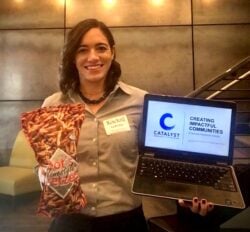Compelling personal stories from Catalyst employees about navigating identity, racism, and privilege.
Throughout corporate America, Latinas have been emerging as prominent leaders, with an increasing number in large public companies with significant operating roles. Yet they may fall victim to adversities and racism within the workplace. A recent study found that while Hispanic buying power is approaching $1.7 trillion annually, senior-level Latina talent is leaving corporate America at an alarming rate.
Four members of the Catalyst staff share their stories of feeling on guard, defending their identity, and what it takes to build a resilient mindset – and, equally importantly, how colleagues can be allies.
A Latinx Experience During Covid-19
 By Corin Ramos
By Corin Ramos
As a Chicana and first-generation college graduate, I have always felt different or on guard within professional and academic settings. It has always been difficult to have this weight on me—the feeling of knowing I am different and that I would have to defend myself against people who think I am not in the right place.
Over the years, I have gained acknowledgement and clarity of my present and past privileges. As the daughter of a migrant farmworker and shoe shiner, I am forever grateful for the countless opportunities I have had throughout my life. My story and experiences are not typical, and as a Chicana, I feel immensely lucky to still be employed during the global pandemic.
Right now, in the midst of the pandemic, so many Latinxs find themselves without work and without an income. This reality may be especially detrimental to parents who find themselves tethered to their homes while their children attend school virtually.
Fortunately, I work from home and do not have to send my child to daycare in order to make a living. However, many Latinx parents are still employed but do not have the benefits I do. In fact, working parents find themselves hiding their parenting duties and fearing reprimand or even termination if they ask for help. If more employers realized that flexible work schedules benefit businesses as well as employees, they might implement such models in support of Latinx and other parents. Acknowledging and supporting working parents is part of a creating an inclusive workplace.
Navigating Racism and Afro-Latinidad
 By Samantha E. Erskine
By Samantha E. Erskine
“How are you Latina?!” I have been asked this question so many times—mostly from other Latinas who have questioned my legitimacy and belongingness since I was a kid. The first time this question spilled over into my professional life was five years ago, when I was invited to be a panelist at a professional event intended to empower Latinas. A Latina approached me demanding to know, “How are YOU Latina?!” I’m half Costa Rican and half Panamanian. Although my surname, hair texture, and skin tone don’t align with colonial logics of “Latinidad,” I have worked through my identity issues, so colorism in the Latinx community, while always hurtful, no longer surprises me.
For many years, I worked at social justice organizations in New York City with like-minded colleagues and was mostly shielded from racism and sexism in the workplace. However, I’m currently pursuing a PhD in the Midwest. Now, microinsults, microinvalidations, and microassaults come from White men “thought leaders” who ask me things like, “Is your family from the jungles of Costa Rica?” (no, they own houses; they don’t live in “jungles”) or tell me that “Latin Americans are White” (Latin America enslaved more people than the US did, so Latinxs are a blend of races). These statements are bolstered by non-Black Latinas telling me they are “more Latina” than I am. FYI: I’m not “less Latina” because I’m a Black Latina.
Being Afro-Latina has given me a quadruple consciousness—I’m simultaneously Black, Latina, a woman, and first-generation American. Intersectionality shapes my values, perspectives, and boundary-spanning leadership in the workplace, on boards, in my research topics/analysis, and my community.
Why Being Ambitious and Solutions-Oriented Isn’t Enough
 By Xochitl Ledesma
By Xochitl Ledesma
When I was growing up, my parents were my superheroes. They had so many superpowers that I lost count. My parents were chefs on the weekends, starting their own catering business; property managers helping family with their properties; and car dealers renting out our car.
As part of a low-income household, I grew up only hearing my parents speak about solutions because they didn’t have any other choice. In the midst of hardship, I learned a valuable perspective that would help me overcome any challenge in life—knowing that there is always a solution.
This solution-oriented mindset helped me excel in school and achieve great things throughout my career; however, it wasn’t enough to obtain recognition in my career. Regardless of how many solutions I implemented, if I did not have an advocate, my work many times went unseen.
My experience is not unique. Today, Latinas are the lowest paid in the US workforce, and even in the face of adversity, we still report the highest level of intent to want to become influential leaders and have intellectually stimulating work.
As a solution-oriented diversity and inclusion professional, I see answers to the lack of recognition of the Latinx workforce. It is time for leaders to pay attention to whose voices are being heard more carefully, to encourage allyship among team members, and to have the courage to stand against biases.
Being a Superwoman and a Role Model
 By Tahiana Abad
By Tahiana Abad
Being an Afro-Latina immigrant has taught me one valuable lesson about persevering in the United States—the power of having a superwoman mentality. To me, a superwoman mentality means having everything under control despite the accompanying emotional and physical turbulences.
It means taking it upon yourself to make sure you are always 100% ready each day, successfully filling multiple roles, and victoriously juggling every aspect of your life. This framework of thinking has led me to continuously exceed in my roles and expectations as a student, colleague, daughter, sister, and friend.
As a Latina worker, I have always felt inclined to go the extra mile for every task assigned to prove that I can handle any challenge. I feel as if it is my duty to positively represent the Latinx and Hispanic communities, especially the immigrant community, during these challenging times.
Despite the emotional tax we face on a regular basis, I want everyone to know that anything is possible, despite the pushbacks and barriers this country places on our path.
What Can You Do
If you are Latina, remember that you don’t need to wait until Hispanic/Latinx Heritage Month to celebrate our culture in the workplace. Every day is an opportunity to celebrate, and every day provides an opportunity to participate in conversation.
- If you are not Latina, learn how to foster diversity and inclusion within your company. Fight against bias and racism both within and outside of the workplace.
- Review your organization’s promotion and mentorship program to remove biases based on race, gender, and parental status.
- Be aware of, and change, the way you speak to and of Latinas about gender and race in the workplace. Words matter.
- Support working Latinx parents and other parents during this difficult time. Improve or implement inclusive remote and flexible work conditions for employees.
- And everyone, no matter how you identify and who you are, should do more to engage in conversations about gender, race, ethnicity, and culture.